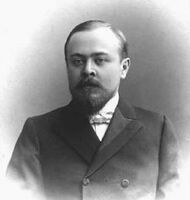N. D. Mironov
| PersonType | Category:Editors |
|---|---|
| FirstName / namefirst | Nikolai Dmitrievich |
| LastName / namelast | Mironov |
| MainNamePhon | N. D. Mironov |
| SortName | Mironov, Nikolai |
| bio | Nikolai Dmitrievich Mironov (b. 1880, Dresden d. 1936, Ariane, Tunisia) was a Russian orientalist, Indologist, Sanskritologist, and politician.
He was born in the family of Dmitry Gavrilovich and Taisiya Alekseevna Mironov. He graduated from the First St. Petersburg Gymnasium. He studied at St. Petersburg and Strasbourg Universities, where his mentors were Professor E. Leiman, a specialist in Jain literature and Khotanese manuscripts, and Professor Heinrich Khyubshman, a comparative Iranist. In 1901–1902, at the University of Berlin, he listened to lectures by the researcher of the Avesta, Iranian scholar, Professor Karl Friedrich Geldner, as well as a prominent specialist in the field of Prakrit grammar, Professor Richard Pischel and a Tocharologist, Professor Emil Sieg. In 1902–1903 he studied at the University of Bonn with Sanskrit professor Hermann Georg Jacobi. In October 1903, at the Faculty of Oriental Languages of the Imperial St. Petersburg University, he received a master's degree in Sanskrit literature. In the same year, at the University of Strasbourg, he defended his dissertation "Dharmapariksha Amitagati", dedicated to the study of the work of a Jain author of the 11th century, and received a Ph.D. During the 1905 revolution, Mironov was an assistant professor at Moscow University and a teacher of Sanskrit. Mironov created a Socialist-Revolutionary group called "Organization of an armed uprising" and its printed organ - the bulletin "Petrel". Attracted A. F. Kerensky to cooperate in the bulletin. Burevestnik soon became one of the leading publications of the Socialist Revolutionary Party, but Mironov himself never made it to the Socialist Revolutionary leaders. In 1909-1911, Mironov published a number of articles in scientific periodicals: "Proceedings of the Imperial Academy of Sciences", " Bibliotheca Buddhica", "Journal of the Ministry of Education", "Notes of the Eastern Branch of the Russian Archaeological Society", articles about India, Indian literature, religion and philosophy in the encyclopedic dictionary of Brockhaus and Efron. In 1916 he was invited to the position of Privatdozent of the Historical and Philological Department of Petrograd University. After the February Revolution, Mironov, with the support of Kerensky, was appointed head of the newly created counterintelligence department of the Ministry of Justice. On July 27, 1917, he was appointed head of the counterintelligence department of the headquarters of the Petrograd Military District instead of B. V. Nikitin. Mironov directed his main efforts to the search for "counter-revolution" and "monarchist conspiracies." The first was the case of General V. I. Gurko, who was arrested on July 21, 1917 on the basis of an order signed personally by Kerensky. The reason for the arrest was a letter that Gurko addressed to the former emperor, which contained harsh words against the revolution and its leaders. Before the Kornilov speech, "Mironovskaya counterintelligence" managed to identify and arrest some of Kornilov's supporters in Petrograd. On the eve of the Kornilov speech, together with B. V. Savinkov, Mironov arrived at Headquarters to arrest the most prominent members of the conspiratorial group. But in Mogilev, where the Headquarters was located, no one perceived Mironov's powers and his instructions as binding. Moreover, General Kornilov told Savinkov in a confidential conversation that if Mironov proceeded with arrests, he himself would be immediately shot. During the civil war he left for Irkutsk. Since October 1918, Mironov began teaching at the Department of Comparative Linguistics and Sanskritology of the newly opened Irkutsk University as an extraordinary professor, and since 1920 he was in charge of the Oriental Studies cabinet. After the final establishment of Soviet power in Siberia, he emigrated to China. From 1926 until his death in 1936 he lived in Ariana (Tunisia). (Source Accessed Apr 6, 2022) |
| YearBirth | 1880 |
| YearDeath | 1936 |
| BornIn | Dresden |
| associatedwebsite | http://worldcat.org/identities/lccn-n87842254/ |
| Other wikis |
If the page does not yet exist on the remote wiki, you can paste the tag |

